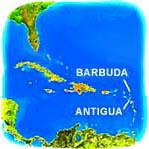WASHINGTON D.C., United States, Friday April 12, 2013 – The International Monetary Fund (IMF) says it is making available more than US$10 million to Antigua and Barbuda after completing review of the island’s economic performance under a three-year Stand By Arrangement (SBA) indicating also that the economy is showing signs of gradual recovery after three years of being stagnant.
The IMF said it had also approved a waiver of non-observance of the continuous performance criterion on external arrears.
“This waiver was granted on the basis of the temporary and minor nature of the deviations from the programme objectives and the corrective measures undertaken by the authorities,” the IMF said in a statement.
It said that the completion of the reviews allows the immediate disbursement of US$10.162 million, bringing total disbursements under the arrangement to US$76.2 million.
“Antigua and Barbuda’s economy is recovering gradually after three years of recession brought on by the international financial crisis. Tourism arrivals increased in 2012 and government programmes provided an incentive for housing investment,” said Naoyuki Shinohara, IMF Deputy Managing Director.
But he noted that “significant risks to the macroeconomic outlook remain, including from a slowdown in advanced economies, higher import prices and natural disasters.
“The government continues to make progress in fiscal consolidation through expenditure restraint and improvements in revenue administration. All performance criteria for end-December 2012 were met, except for a minor breach of the continuous performance criterion on external arrears for which corrective action has been taken. “
The IMF said that the government is maintaining “its successful efforts in debt restructuring to reduce the burden of debt service, although potential contingent liabilities in state-owned enterprises and the banking sector remain a concern.
Shinohara said the 2013 budget is consistent with the government’s goal of reducing the debt ratio to 60 per cent of gross domestic product (GDP) by 2020.
He said continued implementation of structural reforms in revenue administration and public financial management will be essential to achieve the 2013 fiscal targets while providing space for productive public investment in human capital and infrastructure.
“Reducing concessions in customs and other tax expenditures will be an important part of this effort. The passage and implementation of best practice legislation in customs and tax administration will also ensure the sustainability of the fiscal consolidation effort going forward.”
The IMF said that Antigua and Barbuda expects to conclude the resolution of ABI Bank by end-April, 2013.
“This will reduce uncertainty in the domestic banking system and free resources to concentrate on other important financial sector reforms, including strengthening banking supervision, updating the regulatory and legal framework, restructuring the indigenous banking system and improving the Anti Money Laundering/Countering the Financing of Terrorism supervisory framework.
“Making the government’s asset management company operational will also be important to maximize recovery from the impaired assets of the ABIB resolution,” he added.










